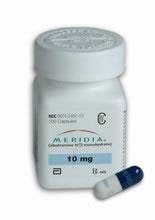
This drug is recommended only for obese patients with an initial body mass index (BMI) greater or equal to 30 ( a person who is 5?5" and weight 180 pounds), or a BMI of 27 in the presence of other risk factors, such as diabetes, hypertension, arthritis, sleep apnea, or dyslipidemia (low HDL and high triglycerides) (Fentress, 33-34). BMI is a measurement based on height and weight as they relate to body fat. It can be used to determine how much risk people have of developing certain health problems because of their weight. Someone with a BMI of 27 is approximately 20% overweight. The higher the BMI, the greater the risk a person has to develop additional health problems.

Meridia, recomended for obese patients only
The drug should not be used by patients who:
- take drugs called monoamine oxidase inhibitors (MAOI?s), which are used for depression, Parkinson?s Disease, and other disorders. This is very important because serious, sometimes even fatal, reactions can occur if Meridia is taken at the same time MAOI?s are taken,
- take other weight loss medicines that act on the brain, such as phentermine. This includes prescription drugs, over- the- counter medicines, and herbal products,
- are allergic to sibutramine,
- have coronary heart disease, angina (heart related chest pain), arrythmias, prior heart attack or congestive heart failure,
- have severe kidney or liver disease,
- have had a stroke or symptoms of a stroke,
- are pregnant, planning to become pregnant, or breast- feeding; · suffer from anorexia nervosa,
- take drugs for depression; have had seizures; · have an eye disorder called narrow angle glaucoma; · are under 16 years of age,
- take other drugs that regulate serotonin. Combining Meridia diet pills with other serotonin regulators can cause a rare, but serious condition called "serotonin syndrome", which requires immediate medical attention and may include symptoms such as restlessness, loss of consciousness, confusion, disorientation, tremors, and increased heart rate. Other serotonin regulators include most anti- depressants, , some migraine headache therapies, lithium, tryptophan, and dextromethorphan (cough suppressant).
Tell Your Doctor if you're taking any of the following medicines:
Meridia may also interact with a variety of other prescription and over-the-counter drugs, especially weight-reducing agents, decongestants, antidepressants, allergy medications, and cough suppressants. Among the many drugs that pose a potential problem are the following:
Alcohol (excessive amounts)
Dextromethorphan (found in many over-the-counter cough preparations)
Dihydroergotamine (D.H.E. Injection, Migranal Nasal Spray)
Erythromycin (Eryc, Ery-Tab, PCE)
Fentanyl (Duragesic)
Fluoxetine (Prozac)
Fluvoxamine (Luvox)
Ketoconazole (Nizoral)
Lithium (Lithobid, Lithonate)
Meperidine (Demerol)
Naratriptan (Amerge)
Paroxetine (Paxil)
Pentazocine (Talwin NX, Talacen)
Sertraline (Zoloft)
Sumatriptan (Imitrex)
Tryptophan (L-Tryptophan, Trofan)
Venlafaxine (Effexor)
Zolmitriptan (Zomig)
Stimulants such as amphetamines, Dexedrine, Desoxyn, Adderall, Didrex, and Ionamin
Do not combine Meridia diet pills with other drugs used to suppress appetite, and do not use it within 2 weeks of taking a drug classified as an MAO inhibitor, including the antidepressant medications Marplan, Nardil, and Parnate.

No comments:
Post a Comment